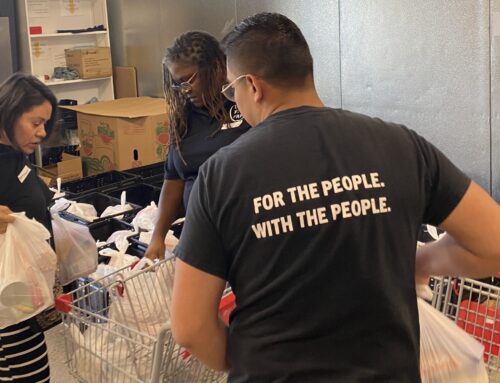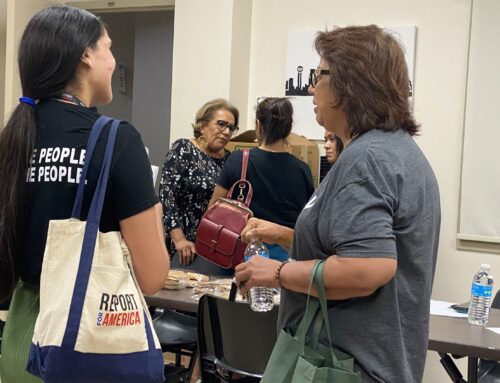Local newsrooms, universities and nonprofits join forces to focus on affordable housing in Dallas

At first it was just coincidence — or perhaps luck — that Dallas journalists Keri Mitchell and Tom Huang started calling up other local journalists in the summer of 2019. They both wanted to brainstorm how Dallas news outlets could work better together.
But Huang of The Dallas Morning News and Mitchell of Dallas Free Press quickly caught wind of each other’s outreach. Fast forward a few years, meetings and a pandemic later, and now Huang, Mitchell and their news organizations are joining forces with several other media outlets, as well as local universities, non-media organizations and the Solutions Journalism Network, to form the Dallas Media Collaborative.
The nonprofit network of organizations will collaborate on reporting, share content and host events, all to highlight and vet solutions to address affordable housing challenges in the Dallas area. The key partners on the project say it’s a topic none of them has been able to consistently address on their own — but it’s a vital, systemic issue demanding greater response.
“The traditional business model [for local news] is not working, I don’t think, very well for civic journalism,” says Mitchell, who founded nonprofit Dallas Free Press to amplify voices in Dallas’ disinvested neighborhoods. “This seems like the only way to really have a big impact in some areas where we need to have a big impact as local journalists.”
Huang, an assistant managing editor at The News, agrees: “We are going to build a strong media ecosystem that illuminates issues of the highest public importance, for the greater good of our community.”
And the collaborative and its solutions-oriented approach might reveal “new paths forward” for local media, said Keith Campbell, managing editor of The News.
The collaborative’s media members include Al Día, KERA, Dallas Doing Good, D Magazine, Dallas Weekly, Texas Metro News and Advocate Media. Southern Methodist University, University of North Texas and University of North Texas at Dallas will participate, providing college journalists and other students with opportunities to learn about and cover affordable housing.
The collaborative also includes the Child Poverty Action Lab, a Dallas nonprofit focused on poverty, and Verdigris Ensemble, a choral group that will brainstorm ways to present housing issues through the arts and music.
The collaborative will receive a grant of $100,000 per year over two years, as long as the first-year goals are met. These funds support reporting, events, project management and other activities the members agree upon. Solutions Journalism Network will provide the grant, and fiscal sponsor Communities Foundation of Texas will manage it.
Solutions journalism — which emphasizes examining solutions to social problems rather than fixating on just the problem itself — will guide the work these organizations do together. The funding is supported by the James L. and John S. Knight Foundation and the Ralph C. Wilson, Jr. Foundation.
Amy Maestas oversees local media collaboratives at Solutions Journalism Network. She says local news organizations have typically been competitors. And this kind of large-scale collaboration would have been inconceivable 20 years ago, perhaps even in the past decade.
But this is not the first local media collaborative of its kind. In fact, the Dallas group draws inspiration from Resolve Philly and the Charlotte Journalism Collaborative, two local media initiatives with similar origins that are now nonprofits.
They are among several local media collaboratives around the country that Solutions Journalism Network is stewarding, with the goal of supporting at least 15 over five years, said Liza Gross, vice president of practice change at Solutions Journalism Network.
Some groups in the Dallas collaborative have already participated in partnerships, including The News, KERA, Dallas Free Press, Dallas Weekly and Texas Metro News.
Texas Metro News entered an agreement with The News in July 2020 to share resources at no cost to Texas Metro News and help The News bolster its coverage of the Black community in Dallas. Cheryl Smith, editor and publisher of Texas Metro News, said the experience has made her optimistic about being part of this latest collaboration.
“I don’t want [a scenario where,] if I were not at the table, there would not be any Black representation in the stories,” she says. “And I don’t think that will happen. I know it won’t happen with the group we have here.”
Gabrielle Jones, KERA’s audience editor, said it will be important for the collaborative to emphasize community engagement. “I think it’s essential to have organizations involved who are not just thinking about the content of the media product, but are working with people in the community and thinking about solving those problems every day,” she says.
The collaborative will benefit from data provided by Child Action Poverty Lab, said Ashley Flores, the lab’s senior director. Housing is a complex issue with many layers, demanding “nuanced treatment,” she said. But that’s what makes the solutions journalism approach sound promising to her, with its potential to spotlight a pervasive problem and investigate smaller, actionable solutions.
The collaborative is currently searching for a project manager. “We’re holding back until we get our project manager on board, but I know we all have a bunch of ideas,” says Mary Martin, managing editor of Dallas Doing Good. “I cannot wait to do a big whiteboard session with this whole team.”
Many of those involved hope that this will mark the start of something not just big, but lasting.
“My hopes are that [the project] eventually emerges as a sort of a constant drumbeat” that draws attention to systemic issues Dallas faces, says SMU journalism professor Jake Batsell.
Mitchell agrees: “Some sort of organization where we continue doing this work and focusing on deep-seated systemic issues together is the long-term goal of this. And I think we have a pretty good shot.”
This story originally was published by our Dallas Media Collaborative partner, The Dallas Morning News.





